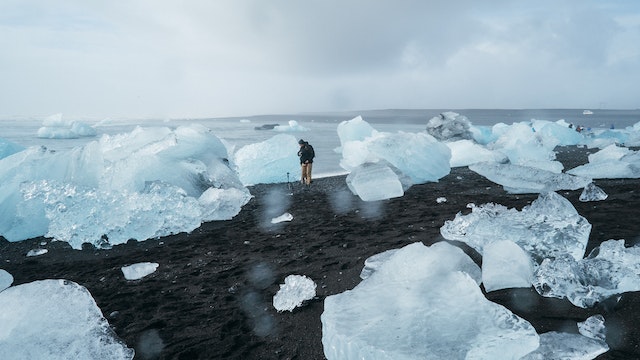
Do all liquids expand when they freeze? No. Water is the only liquid that expands when it freezes.
There are four states of matter: solid, liquid, gas, and plasma. As almost all substances go from the solid phase to the liquid phase and then to the gas phase, they become less dense. This is all to do with energy. If a molecule is heated, it picks up thermal energy from the source of the heat. Thermal energy is kinetic energy which is delivered when the molecules of the heat source, which have a high level of kinetic energy, collide with the molecules of the substance being heated and transfer that kinetic energy. The kinetic energy makes the molecules move a lot and they start to spread out. The more energy they have, the more they move and the more space they take up, becoming less dense. This is the gas phase.
As the substance cools down, the molecules begin to lose their kinetic energy and they move less. They take up less space and this is the liquid phase. It is denser than gas, but the molecules can still move so the liquid moves. If more energy is removed, the molecules move even less and become rigidly attached to each other, making a solid. The molecules have almost no energy and do not move. The solid state of matter is usually the densest of all the states because the molecules are as close together as they can be.
This does not happen for water. If you apply a lot of energy to water, it will become steam, which is the gas phase. It is not very dense in this state. Then, if you remove some of the energy, it becomes the liquid form, which is water. It is dense enough that it doesn’t compress much, but it is not so dense that it cannot flow. If you remove more of the energy, the water will start to contract until it reaches 4℃, at which point it will start to expand. When it hits 0℃, it freezes and expands by about 9%. This is unique among liquids. Because it has expanded, it takes up more volume, and becomes less dense than water. Icebergs float on the sea and ice cubes float in your drink because ice is less dense than water is. The expansion of water as it freezes is why a can of soda placed in the freezer will explode. The liquid inside will expand until the pressure is too great and it will explode.
So, why does water expand when it freezes? Water is made up of hydrogen and oxygen atoms. One oxygen atom has two hydrogen atoms. Oxygen atoms have a strong negative charge and hydrogen atoms have a weaker positive charge. The hydrogen atoms of one water molecule are attracted to the oxygen atoms in another water molecule. When they connect, it is called a hydrogen bond. If the water has some energy, then the hydrogen bonds break apart and cannot hold the water together. However, if the water is cooled enough and nearly all of the kinetic energy is removed from it, the hydrogen bonds become stronger. They form a crystalline lattice with space between all of the water molecules that are connected to each other. This rigidity with space for air makes ice expand and makes it less dense than water.
Ice being less dense than water allows life to live in the sea or rivers during the very cold winter. With most liquids, it would start to freeze from the bottom up because the solid is denser than the liquid. As the liquid turned into the solid, the solid would sink. Ice is less dense than water so as it freezes it rises to the top and leaves liquid water underneath. If ice were denser than water, the polar ice caps would be at the bottom of the sea and lakes would freeze from the bottom up, killing all of the fish and fauna that live there. The ice floating on the surface of the sea also provides some insulation, preventing the rest of the sea or lake from freezing, allowing life to survive.
Photo by Valdemaras D.: https://www.pexels.com/photo/person-standing-beside-body-of-water-1670845/
Sources
http://www.iapws.org/faq1/freeze.html
https://www.usgs.gov/media/images/strong-polar-bond-between-water-molecules-creates-water-cohesion
